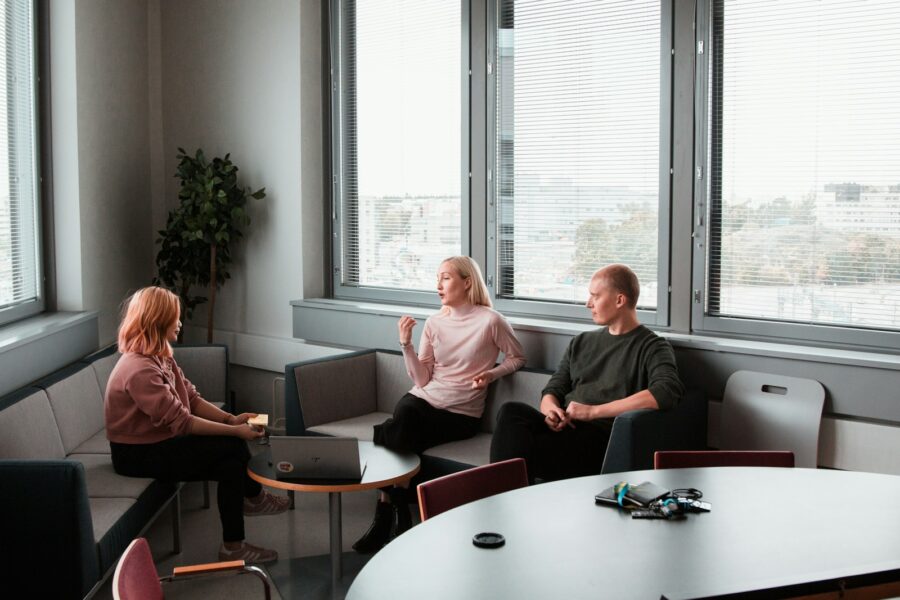Something we must accept – and even expect – is that workplace conflict is mostly unavoidable. When you put a group of people together in high-pressure situations, day in, and day out, there are bound to be instances where colleagues do not get along or issues arise from their working relationship.
These issues can arise for many reasons. There could be a misunderstanding about the importance of certain tasks or a breakdown in communication, like misinterpretation of messages or a comment. Another thing that can cause tension is a clash of personality types, as we all have differing approaches to work and varying communication styles which can sometimes make it challenging to navigate communication.
And with 1 in 4 citing peers as a leading cause of workplace stress in Champion Health’s latest Workplace Health Report, it’s evident that conflict among colleagues is still an issue that affects many people (and organisations).
This report also shows a rise in anxiety and stress levels, with 79% of employees experiencing moderate to high stress. As high stress and poor mental health are the top three factors impacting productivity, it’s clear that the ripple effects of workplace disagreements are felt throughout an organisation.
So, how can both employees and employers tackle such conflicts between colleagues before they escalate, negatively impacting employee mental health as well as productivity?
Make the culture clear and lived
The most effective way to avoid conflict amongst team members is by setting out the core values and principles of your culture early on and communicating them clearly. This can include nice-to-haves, non-negotiables and absolute no-go’s. Ensure everyone knows what they must uphold, why they must uphold it and what kind of attitudes and behaviours will not be tolerated. These values must be lived from the top down for it to really become a part of the “culture”.
Reframe how confrontation is seen
While confrontation can be incredibly daunting, it doesn’t have to be. The way we look at confrontation can and should be reframed, so that instead of viewing it as a negative, we see it as something that empowers people to have open but productive, resolution-led conversations. Give your people the communication skills needed to be able to confidently bring up issues with colleagues in a kind, empathetic and constructive manner. There is no room for aggression in workplace conflict, both parties need to be respectful and listen to each other.
Understand what’s going on behind the scenes
Outside of work, we all lead very different lives. And it’s not controversial to say that our personal challenges can spill into our working lives. There can be much going on for a person that is dictating the way they act in the workplace. So, before a conflict escalates, find out if that person is okay. Try to understand what is going on for them, how it could be impacting them at work, and if and how you can help. Leading with empathy and understanding can instantly defuse a situation and calm tensions.
Offer help through training and resources
If conflicts are escalating and people are not able to resolve issues between themselves, leaning on external resources – like conflict resolution training – can make all the difference.
Additionally, offering mental health resources and clearly signposting them can give people the time and space they need to address the root cause of difficulties and subsequent conflicts, as well as how to manage them healthily.
Communicate and communicate some more
Whether you are in the thick of the conflict or just managing it from the outside, communication is key to resolving such issues and maintaining good working relationships. If we keep checking in with each other, keep offering support and make it clear we are not holding grudges or judging someone over a disagreement, we are fostering an open and kind culture where we acknowledge conflict arises but do not let it define our working relationships. The more we talk honestly, the easier it will become to talk about our differences peacefully and productively.
When it comes to conflict and challenges with our colleagues, we must remember that we are all human. None of us are perfect, and none of us will ever handle a situation perfectly. Not only this, we all have many circumstances in our busy lives that influence how we handle relationships, and the conflicts that may arise within those relationships. This is why patience and understanding for our fellow humans is so essential.
By proactively building a culture based on shared values and empathy, reframing the way we see and handle confrontation, and focusing messaging and training around positive communication, we ensure that even when workplace conflicts arise, we can deal with them healthily and compassionately. Which is something we all deserve.

Harry Bliss
Harry is the CEO and co-founder of Champion Health. In 2018, he set out on a mission to make healthier easier, for everyone. Since then, he has worked towards making wellbeing inclusive, engaging and accessible for the people that power leading organisations.


